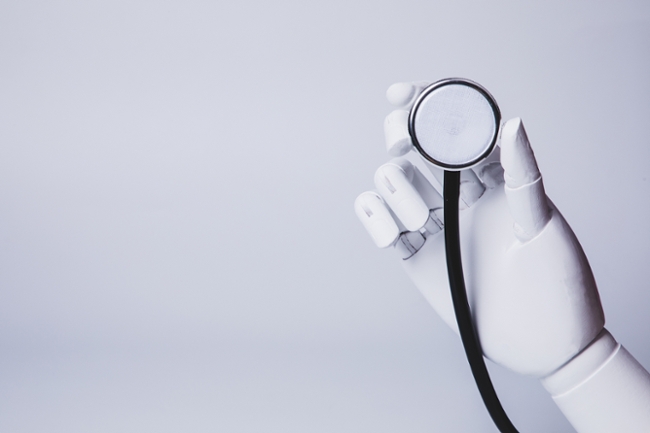| Health informatics news and insights from AMIA | SIGN UP ⋅ SHARE |
|
|
 
 |
| (Kilito Chan/Getty Images) |
Many Americans are turning to AI for medical questions, driven by a frustration with the traditional medical system and AI's 24/7 availability and ease of use. In 2024, 1 in 6 US adults used chatbots to find health information at least once a month, according to a survey from KFF. "If the system worked, the need for these tools would be far less," said Dr. Robert Wachter, chair of the department of medicine at the University of California San Francisco. "But in many cases, the alternative is either bad or nothing."
|
|
|
|
|
Harness dormant customer data goldmines trapped within disconnected systems. A trusted identity setup is key for a panoramic perspective. Unite your information to cultivate enhanced growth, vital insights, and a strategic edge. Download the whitepaper now. |
|
|
|
| ADVERTISEMENT |  |
|
 
| Clinical Informatics & Analytics |
|
Ellen Hengesbach explores the potential dangers of using AI chatbots for mental health support through her experience with Character.AI's "Therapist" chatbot. Despite warning labels, the chatbot encouraged negative feelings and provided unsafe advice, such as tapering off medication without consulting a doctor. Hengesbach highlights concerns about AI's ability to blur fiction and reality, amplify biases and weaken safety guardrails over time, raising questions about the ethical implications and regulatory oversight needed for AI in mental health.
|
|
|
Humana and Providence are collaborating to enhance data exchange using HL7 FHIR standards and Da Vinci Project Implementation Guides, aiming to overcome inefficiencies in payer-provider coordination. This initiative focuses on automating processes like member attribution and clinical data exchange, moving beyond compliance with the CMS-0057 rule to improve interoperability. By leveraging national standards, they aim to scale solutions across the health care industry, with both organizations committed to exceeding minimum requirements for data exchange.
|
|
|
The CEOs of the four leading ambient AI companies -- Abridge, Ambience Healthcare, Nabla and Suki -- remain optimistic about their future despite increasing competition from Epic and Microsoft. These companies are evolving beyond AI scribing to offer broader solutions in revenue cycle management and patient engagement. Abridge's Shiv Rao emphasizes the value of pristine clinical notes for coding and reimbursement, while Suki's Punit Soni highlights their partnerships with various EHR systems and telehealth platforms. Ambience's Nikhil Buduma and Nabla's Alex LeBrun stress the importance of innovation and differentiation in a rapidly consolidating market.
|
|
|
|
|
Retailers face labor shortages, rising customer expectations and unpredictable supply chains, which drive them to reinvent their operations. With mobile technology, retailers can provide real-time visibility, contactless payments, digital receipts and loyalty programs. This paper explores how mobile solutions transform retail operations and engage consumers. |
|
|
|
|
|
 
| Health Data Science & Artificial Intelligence |
|
Organoid intelligence is a developing concept introduced by researchers Lena Smirnova and Thomas Hartung from Johns Hopkins University, which involves using lab-grown brain organoids for biocomputing. The approach aims to harness the cognitive efficiencies of the human brain to create biocomputers with the potential to reduce the environmental impacts of conventional data centers.
|
|
|
Studies presented at the Association for Molecular Pathology meeting highlight the role of optical genome mapping in identifying genetic factors associated with recurrent pregnancy loss. Researchers from Dartmouth Hitchcock Medical Center and Queens University found that OGM can identify chromosomal changes and fragile sites contributing to RPL, which are often missed by conventional tests. This breakthrough could lead to better diagnostic approaches and a deeper understanding of RPL.
|
|
|
Research from the Karolinska Institute reveals that depression starting before age 25 has a stronger genetic basis than depression that begins later in life. Analyzing genetic data from over 150,000 individuals, the study found that those with a high genetic risk for early-onset depression were twice as likely to attempt suicide within a decade. The findings, published in Nature Genetics, underscore the potential for genetics to guide personalized suicide-prevention strategies and highlight a critical window for early intervention. |
|
Research from the Keck School of Medicine indicates that social deprivation, including low income and housing instability, is linked to a higher incidence of diabetic retinopathy in patients with type 2 diabetes, even when treatment adherence is maintained. Published in Eye, the study analyzed data from 3.7 million patients and found that socially deprived individuals experience more severe DR progression and complications, such as retinal detachment and macular edema, over a decade. These findings highlight the influence of systemic factors on health outcomes and the importance of addressing social determinants in diabetes care. |
|
|
A new H3N2 influenza strain could pose a significant challenge to the US health care system, according to international reports. The strain has caused a surge in cases in the UK, particularly among young adults and children, and has acquired several mutations, making it different from the strain included in this year's vaccine. The CDC has yet to provide updated national data because of recent disruptions, but experts recommend vaccination for protection.
|
|
|
AMIA has partnered with Bisk and USF Health to launch a new Health Informatics Microcredential for working professionals. This fully online program helps you build essential data and technology skills in healthcare with flexible, self-paced learning. With health informatics roles growing 15% through 2034, this accessible credential offers a practical pathway into the field without requiring a traditional full-time degree. Learn more, including how to apply. |
|
|
| | |
